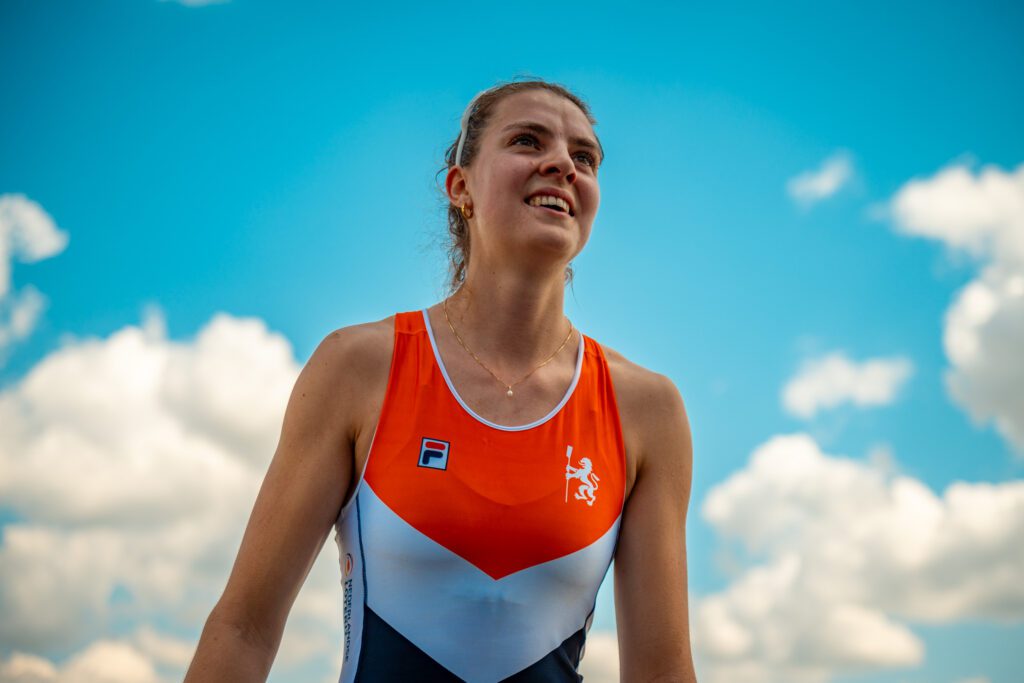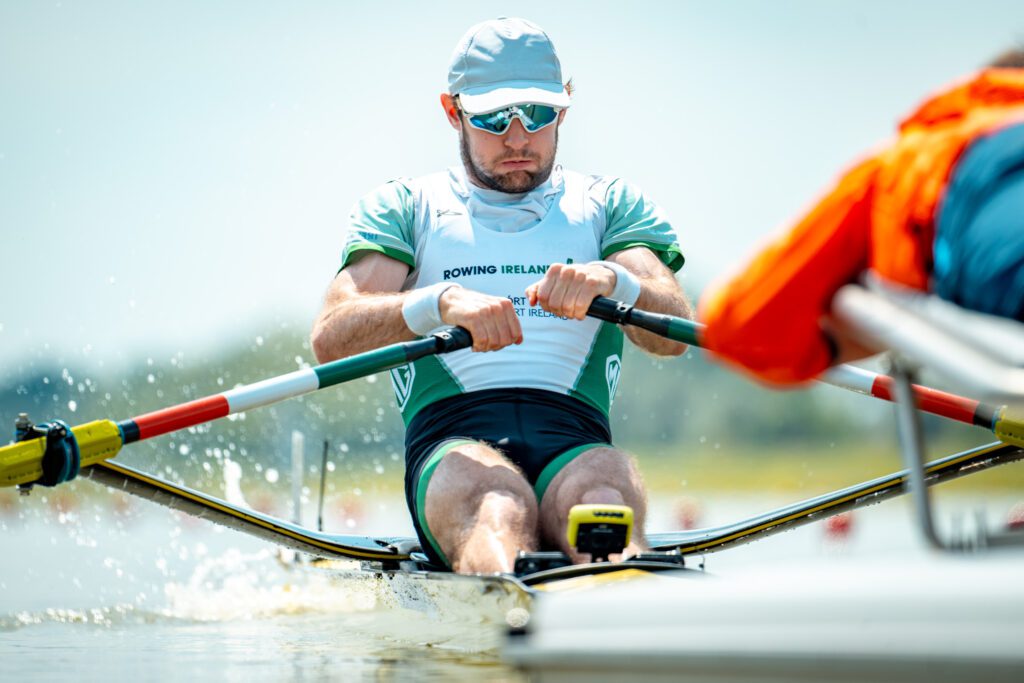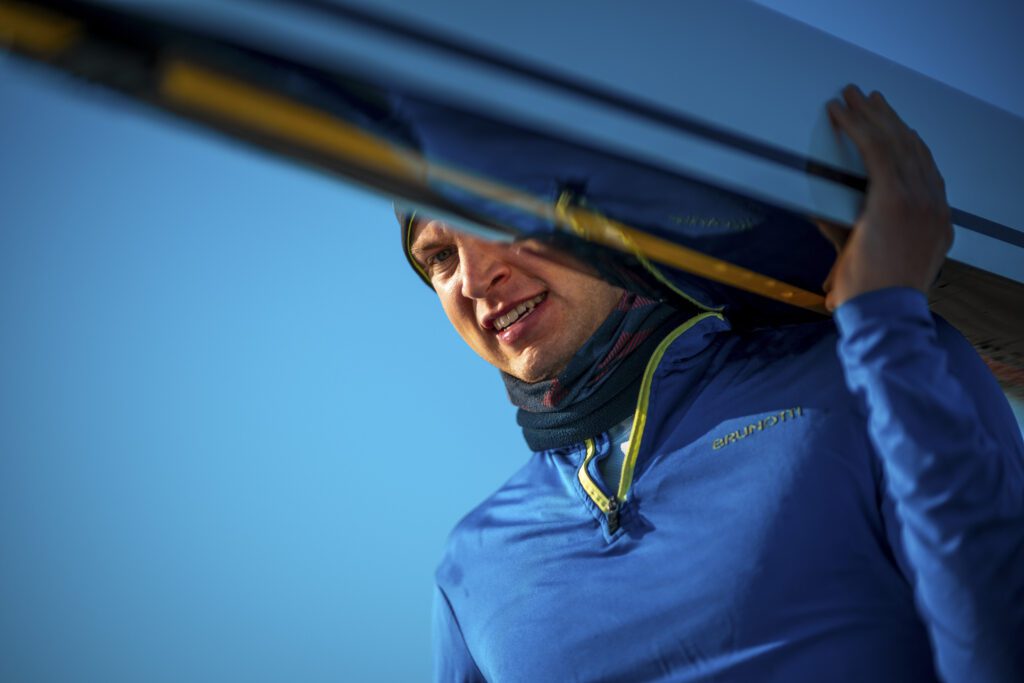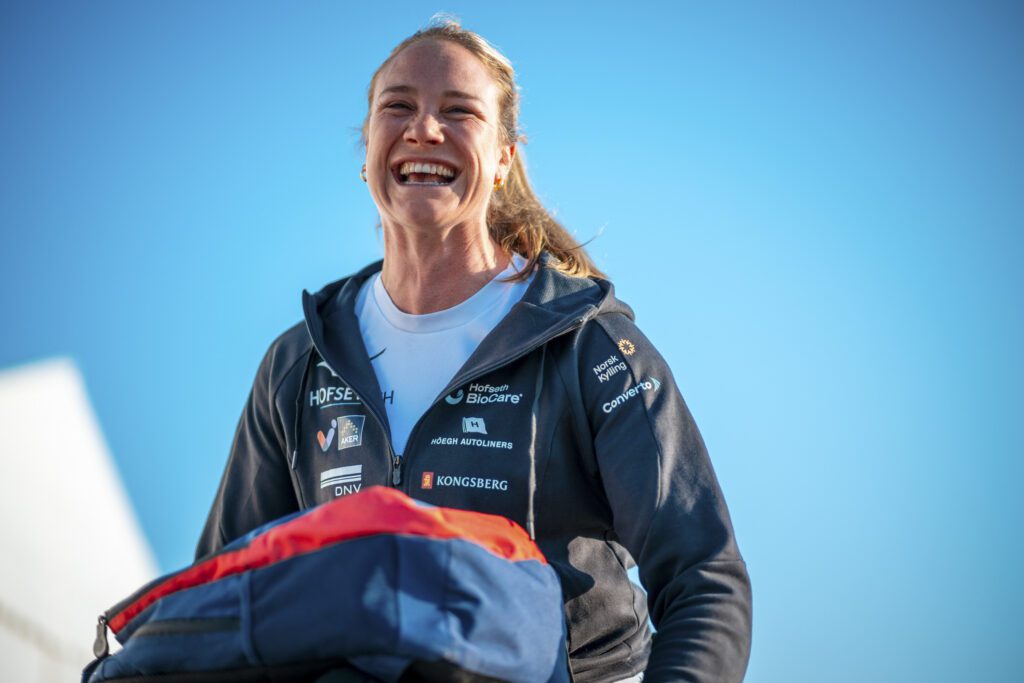The threatening weather having drifted away overnight, the last day of heats boasted the flattest water so far on Lake Sava, and as a result two new championships best times and one world best time were set in the para-rowing events. The first of these was in a single event, Moran Samuel (ISR) taking eleven seconds off Birgit Skarstein’s championship mark from last year while winning a tidy battle against Nathalie Benoit, and minutes later Skarstein herself (NOR) dropping the worlds record by another two seconds in a very easy win against Manuela Diening (GER). Both Samuel and Skarstein qualified for both the final and the 2024 Paralympics, though the rest head for repechages first to sort wheat, chaff and lanes for the final.
Two races after that new British combination Gregg Stevenson and Lauren Rowles showed off by storming to a new world best time in the PR2 mixed double, taking seven seconds off the time Rowles set with former partner Laurence Whitely four years ago, and bettering by twelve the time of the previous heat’s winners, Ireland. What’s interesting about this is that in between the two on current form were Tokyo bronze medallists Jijian Jiang and Shuang Liu (CHN), who haven’t raced internationally since the 2020 Games but are clearly on song. With a posse of current and former medallists all in a similar zone the minor medals in this event will be hotly contested. Ireland and Britain also bagged Paralympic places.
In the PR1 men’s singles the standout winner was Aussie former champion Erik Horrie, almost a whole minute ahead of his nearest rival, German Marcus Klemp. But those studying form will have noted that his biggest rivals Roman Polianskyi (UKR), Benjamin Pritchard (GBR) and Giacomo Perini (ITA) were all within three seconds of him, Polianskyi hounded hardest by Brazil’s likely finalist Rene Campos Pereira and having to rate high all the way to the line. All the above-named have got a spot at the Paralympics so that’s one job done, but now the gold medal is waiting to find out who will take it home. Meanwhile the first contested A-final places were filled as Australia and China swiped the last two spots in the PR3 coxed fours medal race.
While stray dogs were chased off the start pontoons (for not wearing an accredited photo bib), racing continued in increasingly hot weather, leading to more of the competitors cutting short their water warm-downs and going straight for the ice vests and an erg or static bike rehab of their aching legs.
Highlights of the rest of the day included some last-chance repechages and the eights’ first-chance heats, in the earliest of which China’s men’s eight had a shocker. Three strokes off the start the blade of their 7-man, Gaoxing Ji, suddenly broke and the crew had to row all the way to the finish in sixes, albeit rating 28-30 so as not to delay the race behind them too much. Meanwhile Britain’s M8+ was busy beating the Dutch and Canadians (the latter sent to the rep despite a storming final sprint), and in the second heat Australia and the USA chased China’s faltering stern up the middle lanes, swapping the lead twice before the Aussies proved better to the line. Germany was the third crew there, and will be hoping to reach the final via the repechage, while the Romanian men, now with their M4- doubling up into the eight, dawdled to the line last to save energy.
The women’s events are still affected by some tactical doubling-up, a few nations preferring to have good rowers strengthen the crew boat towards qualification rather than reducing their distractions. Romania still has their women’s pair and four doing double duty in the eight, Britain have their pair in and Italy their four, and the rest have completely separate crews. One of those is Australia, keen to break all the bad luck they’ve had in previous Olympiads and break their medal-less streak in the W8+. We also have Italy’s first-ever senior women’s eight in the mix, who acquitted themselves nicely, vying with Britain for second place behind Romania (with one to qualify) before falling prey to the usual GB tactic of a strong third quarter. Romania meanwhile were well clear and look set to have a shot at multiple golds, having won their fours and pairs heats the day before with ease.
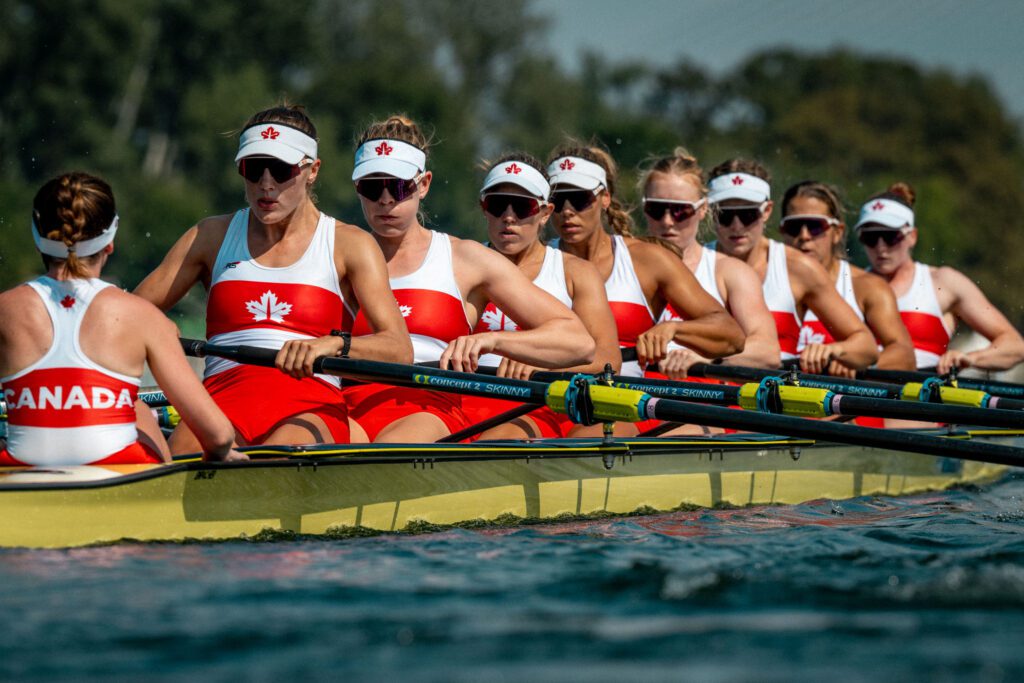
Photo CAN W8+ on the start line in their heat on Tuesday.
Credit Benedict Tufnell
This year has only ten M8+ and eight W8+ in the competition, an interesting position to be in given that one long-term possible answer to the conundrum of dwindling IOC rowing seat numbers would be to make the big boats doubling-up only. Another trend worth tracking is the coxing genders in the Olympic-class eights, since the change to allow anyone to cox any crew in 2017. Back in 2011, just before the London Games, there were 13 men’s eights, all with male coxes, and eight women’s eights, all with female coxes. This went to 12 M8+ and 10 W8+ in 2015, and in 2017 under the new rules, Sam Bosworth became the first man to cox a women’s eight to a world medal in a field of eight crews, while all twelve of the men’s eight coxes were male. In 2018 the coxing ratio across both eights events was 9:8 men to women which has steadily changed, to 8:13 (2019), 6:11 (2022) and this year 7:11 men to women with a half and half ratio in the M8+ (offset by two men coxing women’s crews). There are more small light women than there are men, of course.
The fours repechages were superb, four crews over three seconds for three semi places in a breathless women’s race-off, with Spain losing out to Canada, Germany and Poland. The two men’s fours reps were equally tight, Ireland and China slightly behind but the rest in identikit blanket finishes. In the first, Denmark beat Germany by a quarter of a second for the last semis spot, in the second race South Africa did the same to Poland, this time by only 0.02 seconds. 15 minutes later Norway’s men’s quad claimed second over the USA in their rep by one-hundredth of a second, though both went through to the semi-finals behind winners Australia.
Finally the postponed races for lanes were held for straight-final events, including the first of what will be two solo row-pasts for Ukraine’s PR2 women’s single sculler Anna Aisanova (Turkey also had an entry but have withdrawn), while reigning champion Cornelis de Koning had his usual competent row in the PR2 men’s singles. Ukraine also dominated the PR3 men’s pair (there are no PR3 women’s pair entries this year) and Italy look set to capture a few barely-contested non-Olympic lightweight golds.
Wednesday is crunch time, with another one hundred crews dropping like stones off the medal conveyor belt. Pedal to the metal.
